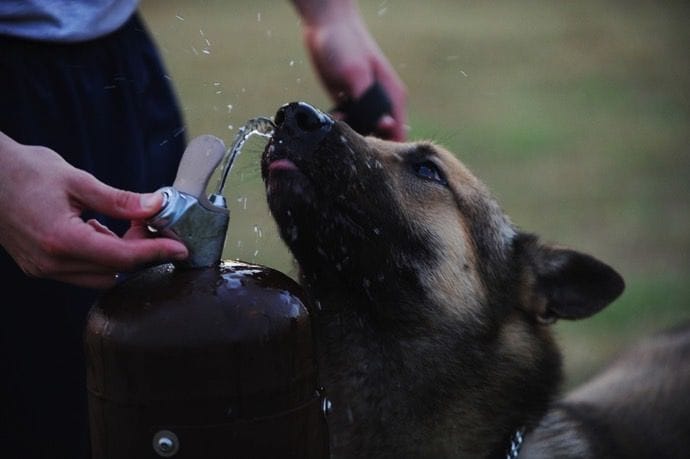Before your family wakes up to see what trinkets Santa left under the tree Christmas morning, be sure that you have taken all of the proper precautions to keep your dogs and cats safe this holiday season.
While the holidays are fun for us humans, they can present a lot of dangers to our furry family members. Don’t let your Christmas get interrupted by a trip to the emergency vet!
Here are a few Christmas safety tips to help you keep your fur family safe this holiday.
1. Pet-Proof The Christmas Tree
Perhaps the epicenter of holiday danger for your pet is the Christmas tree. Failing to pet-proof the “O Tannenbaum” could result in upset stomachs, painful injuries, catastrophic veterinary bills, or even tragedy this Christmas season.
Make sure you anchor the tree securely to avoid a dangerous tree-tipping disaster. Check your tree stand daily to confirm that the eyebolts are still locking the tree in place.
For added security, anchor the tree to your ceiling with a ceiling hook and fishing line.
2. Beware Christmas Tree Water
(Picture Credit: Tom Werner/Getty Images)
Pet parents who bring live pines, spruces, and firs inside for Christmas should make sure the water reservoir inside of the tree stand is not easily accessible to dogs and cats. As the tree drinks water, it can release sometimes-toxic sap into the stand that smells tasty to pets.
Many fresh trees are also preserved with pesticides and fertilizer water additives, including aspirin. Aspirin can be fatal for cats because they lack a necessary protein in their livers to break down the drug. While veterinarians occasionally prescribe aspirin for dogs to treat various conditions, too much can prove deadly.
Block access to the tree stand by thoroughly covering it with aluminum foil and a well-wrapped tree skirt.
3. Be Careful With Christmas Lights
All the lights and baubles you use to adorn your Christmas tree and your home sure are pretty, but they can pose a real threat to your pet. Veterinarians say pets can easily die from electrocution, internal injuries, or intestinal blockage after enjoying a decorative snack.
Be sure you fasten holiday lights to your tree and place cords out of reach of your curious pet’s mouth. Block access to any loose cords or wires.
4. Ornaments Can Be Deadly
Those might look like tree ornaments to you, but to Fido and Fluffy, they are just potential toys in a festive display.
Chewing on ornaments can cause cuts in the mouth, throat, and digestive system, as well as other serious injuries.
Tree-trimmings like garland and tinsel, when eaten, can also result in gastrointestinal blockages that have the potential to harm or even kill your pet.
5. Pick Safe Christmas Plants
Popular decorative plants like holly, mistletoe, and the poinsettia can be poisonous if ingested.
English and Asian varieties of the holly plant contain toxic saponins, which can cause serious gastrointestinal distress when eaten.
The viscotoxins in mistletoe are nothing to kiss over; eating the leaves or berries of this common Christmas plant can cause stomach upset and a slowed heartbeat.
The poinsettia flower is typically only toxic when ingested in large quantities, so its reputation as the most dangerous Christmas plant is somewhat undeserved. That said, the milky white sap of the poinsettia tends to cause diarrhea, excessive drooling, and vomiting, which can endanger a pet’s health.
Christmas bouquets and floral arrangements that contain lilies are very hazardous to pets, especially cats. All it takes is a few bites of a lily plant to cause potentially fatal kidney failure in felines.
Cautious pet owners should probably steer clear of including these beautiful but dangerous plants in their Christmas décor.
6. Keep Gifts And Candy Out Of Reach
Make sure your stockings really are hung by the chimney with care this holiday season; children’s toys, gift wrap, and candy should be kept out of reach at all times.
If you believe your pet may have eaten something he or she shouldn’t have this holiday season, contact your veterinarian immediately. Keep the numbers to the nearest emergency veterinary hospital handy if harm or injury should happen after hours.
Finally, call the 24-hour ASPCA emergency poison hotline at 1-888-426-4435 if you have any concerns about potentially harmful substances ingested by your pet. Specialists are available to aid you every day of the year, including Christmas.
What steps are you taking to keep your pets safe this Christmas? Do you have any other tips for pet parents? Let us know in the comments below!










